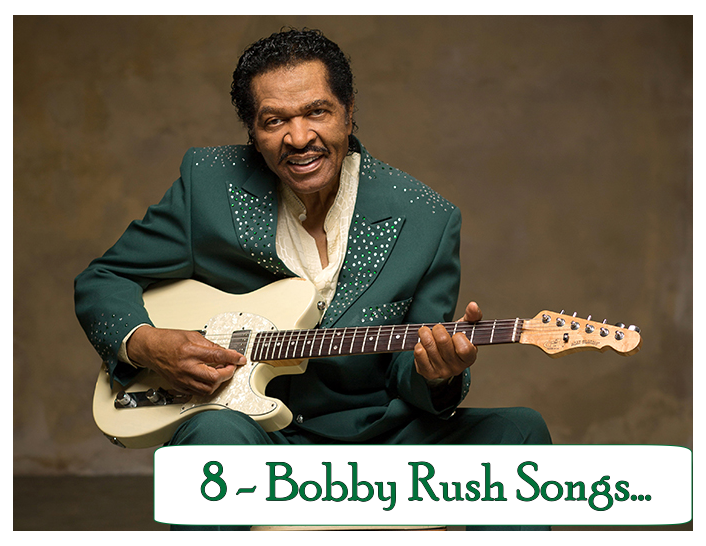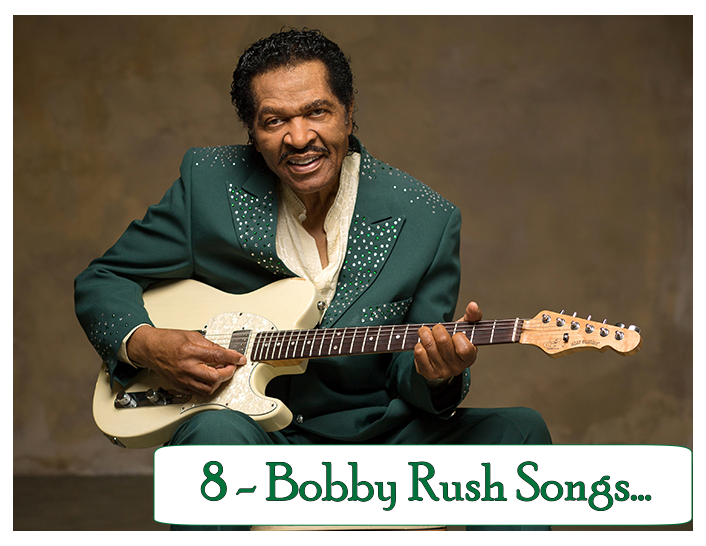-
 play_arrow
play_arrow
Praise 24/7 NO Today's Best Gospel
(ThyBlackMan.com) With a career spanning over seven decades, Bobby Rush stands as one of the most resilient and influential figures in American music. A master of blending blues, soul, and funk with deeply rooted Southern storytelling, Rush has carved out a unique niche that few artists can rival. His music is often humorous, insightful, and laced with double entendres, but underneath the charm lies a commitment to preserving and evolving the blues tradition. From juke joints to the Grammy stage, Bobby Rush continues to captivate audiences with songs that are both timeless and culturally resonant.
Here are eight standout songs from Bobby Rush’s expansive discography—each one showcasing his artistic depth, lyrical wit, and unmistakable groove. Whether you’re a longtime fan or just beginning your journey into his music, these selections offer a rich entry point into the work of a living legend.

1. “Chicken Heads”
“Chicken Heads” isn’t just Bobby Rush’s breakthrough hit—it’s a cultural artifact, a cornerstone of southern-fried funk-blues that bridges generations. Released in 1971, the song became his first gold-certified single and launched him from the Chitlin’ Circuit to broader acclaim. But more than a chart success, this track announced the arrival of a storyteller who could fuse humor, street smarts, and infectious grooves into a single musical package.
The musical foundation of “Chicken Heads” is deceptively simple—a laid-back, syncopated funk riff riding on a swampy guitar line and deep-pocket drums. That rhythmic elasticity allows Rush to drop into a half-spoken, half-sung cadence that feels improvisational and razor-sharp. Every line sounds like it’s being crafted in real-time, like he’s confiding in the listener across a café table or bar stool. His phrasing is unhurried, confident, and conversational—an essential trait of great bluesmen.
Lyrically, the song is a masterclass in subtle innuendo and folk wisdom. The metaphor of “chicken heads” speaks to both the idea of someone being easily led and to the disposable way lovers treat one another in relationships gone sour. But there’s no moralizing here—Rush is an observer, not a judge. He simply lays out the scene and lets you interpret it, which is part of the song’s enduring appeal.
More than five decades later, “Chicken Heads” is still sampled by hip-hop artists and featured in film soundtracks, proving its relevance and magnetism. Whether you listen on vinyl, stream it on a playlist, or catch Bobby performing it live—this is a track that transcends time, encapsulating the wit and rhythm that define American blues at its most vibrant.
2. “Sue”
“Sue” exemplifies the richness of Rush’s mid-career output—when his storytelling sharpened, his arrangements became more nuanced, and his characters leapt from the lyrics like figures in a novel. The song doesn’t rely on commercial hooks or radio-friendly polish. Instead, it’s about feeling—setting a scene so vividly that you can smell the perfume, feel the tension, and hear the room go silent when Sue walks in.
Instrumentally, the song is a marvel in restraint. It opens with a dusky guitar and a mellow organ progression that sits low in the mix, giving Rush’s voice center stage. The band’s minimalism highlights every inflection in his delivery—from the sly pauses to the gravel in his tone. It’s storytelling as performance art, and few do it better than Rush.
What makes “Sue” so compelling is the emotional complexity he weaves into the narrative. She’s not just a femme fatale or a cautionary tale. Sue is someone Bobby Rush both desires and fears. He knows he’s playing with fire, but he can’t look away. This push-pull dynamic mirrors real human relationships, where attraction and danger are often intertwined.
This track also offers a rare moment of vulnerability in Rush’s catalog. He’s not flexing or clowning here—he’s laying bare his emotional landscape. And that openness gives “Sue” its staying power. It’s a song best experienced in solitude, with headphones on and the lights low. It reminds you that the blues isn’t just about heartbreak—it’s about recognizing desire in all its messy beauty.
3. “Night Fishin’”
Bobby Rush has long blurred the lines between metaphor and meaning, and “Night Fishin’” is one of his most hilarious and sexually charged examples of that art form. At its core, the song is about seduction cloaked in backwoods charm, but it’s also a commentary on the way Black southern men have historically used coded language to communicate deeper truths—especially in spaces where directness could be dangerous or taboo.
The groove is irresistible. It’s slow and thick, built on a bottom-heavy bassline that feels like molasses on a hot evening. The guitar licks are twangy and conversational, echoing the way Rush delivers his lyrics—like he’s telling a joke he knows you’ll catch the second time around. The harmonica flutters in at the right moments, reminding you that even when he’s being playful, Bobby is a bluesman through and through.
Lyrically, “Night Fishin’” is nothing short of genius. Every line is a double entendre, and the song plays like a puzzle you want to solve but also don’t mind leaving unsolved. “I got my pole in the water” might make you laugh, but it also lands with a kind of earthy, grown-folks sensibility that’s missing from much of today’s music. It’s not crude—it’s clever.
This track proves that Bobby Rush is more than a musician—he’s a cultural documentarian. He preserves the linguistic and musical stylings of a time and place often overlooked in modern discourse. “Night Fishin’” is both a party song and a time capsule. It deserves rotation not just for its humor, but for its craft.
4. “Hoochie Man”
“Hoochie Man” isn’t just a song—it’s a character study, a revival meeting, and a funk sermon all rolled into one. Bobby Rush takes the traditional blues archetype of the hyper-masculine ladies’ man and reimagines it through the lens of southern theater. The result is both parody and praise—a tribute to confidence, sexuality, and the stories men tell about themselves.
The track kicks off with a simmering beat, layered with a horn section that punctuates the verses like exclamation points. The guitar work is understated but effective, sliding into the spaces between Rush’s vocals and the percussion with grace. The rhythm section builds a deliberate strut, giving the song its cocky, infectious swagger.
Rush’s performance is captivating. He doesn’t just sing—he becomes the “Hoochie Man.” He breaks the fourth wall with asides, grunts, and chuckles, turning the song into a stage show. You can imagine him in a velvet suit, gold chain swinging, telling this story to a crowd who knows he’s embellishing but loves it anyway. That theatricality is one of Rush’s greatest strengths and part of what sets this song apart from other blues numbers about male bravado.
But beneath the humor and bravado lies something deeper: commentary on the performance of masculinity. “Hoochie Man” isn’t about being tough or dangerous—it’s about being seen, being remembered, and crafting a myth out of your own life. That’s the blues in its purest form. And Rush, as always, delivers with equal parts laughter and truth.
5. “I Ain’t Studdin’ You”
“I Ain’t Studdin’ You” is more than just a catchy Southern expression—it’s a full-blown statement of blues empowerment, and Bobby Rush turns it into a funky, defiant anthem. The phrase itself, deeply rooted in Black vernacular English, implies disinterest laced with attitude. In Rush’s hands, it becomes a liberation chant for anyone fed up with lies, games, or dead-end relationships. The song serves as an emotional release and a hilarious kiss-off at the same time.
Sonically, the track leans into a sparse yet groovy arrangement that showcases Rush’s knack for economy. There’s no overproduction here—just a slinky, tightly wound bassline, some crisp guitar riffs, a sprinkle of keys, and the steady, deliberate rhythm of a veteran band that knows exactly when to play and when to hold back. It’s this kind of restraint that lets the message land. Rush doesn’t shout—he lets the rhythm and lyrics do the talking.
The brilliance of the track lies in its attitude. This isn’t the sad, heartbroken blues of yesteryear. It’s the kind of song that makes you throw your hands up and keep it moving. You don’t cry over lost love here—you dust off your shoulders and dance your way out the door. That emotional pivot in tone is what makes Rush so unique. He understands pain, but he often chooses humor and self-assurance over despair.
In a world filled with love songs that beg or plead, “I Ain’t Studdin’ You” is refreshingly different. It’s the blues equivalent of blocking someone’s number and blasting this song at full volume. Timeless in both its groove and its message, this track is a reminder that the blues isn’t always about mourning—it’s just as much about moving on with style.
6. “Funk O’ De Funk”
“Funk O’ De Funk” is Bobby Rush’s electric sermon on rhythm, body movement, and groove theology. The title alone sets the tone—this isn’t a track that hides its intentions. It’s an invitation to dance, to sweat, and to surrender to the pure, physical joy of funk-infused blues. With its rolling basslines and sultry horn stabs, the song practically dares you to sit still.
From the opening beat, the track commands attention. The bass sounds like it’s strutting through a smoke-filled nightclub, and the rhythm guitar scratches in like it’s whispering dirty secrets. Rush presides over it all like a preacher in a house of funk. His voice is elastic—part growl, part croon, and always in the pocket. Every word is delivered with a sense of urgency and glee, as though he’s letting the funk possess him.
Lyrically, the song is a celebration of the body and everything it can do on the dance floor. Lines drip with sexual tension and cheeky suggestiveness, but it never veers into crudeness. Instead, it walks the line between tease and truth, much like classic R&B party anthems from the ’70s and ’80s. Rush understands that groove is its own kind of language—and he speaks it fluently.
More than just a dance track, “Funk O’ De Funk” showcases Rush’s ability to modernize the blues without diluting its power. He keeps the spirit of Delta juke joints alive but reinvents them for contemporary audiences. The result is a cross-generational jam that feels as relevant in 2025 as it did when it dropped. Whether you’re stepping into a club or just grooving in your living room, this track proves that Bobby Rush remains one of the funkiest storytellers alive.
Finish story here; 8 Bobby Rush Songs That Prove He’s a Blues Legend.
Written by: Black Gospel Radio
Similar posts
-

Praise 24/7 Commercial Free
For every Show page the timetable is auomatically generated from the schedule, and you can set automatic carousels of Podcasts, Articles and Charts by simply choosing a category. Curabitur id lacus felis. Sed justo mauris, auctor eget tellus nec, pellentesque varius mauris. Sed eu congue nulla, et tincidunt justo. Aliquam semper faucibus odio id varius. Suspendisse varius laoreet sodales.
close Top popular

The Science of Happiness – Exploring Factors for Well-Being

Balancing Act: Prioritizing Your Well-Being in a Busy World

Overcoming Procrastination – Strategies for Productivity and Success

Unlocking Hidden Potential – A Guide to Personal Growth

Mindful Living – Cultivating Presence in the Modern Era

CONTACT US
- info@praise247no.com
FOLLOW US
- Praise247NO
- Praise247NO
- Praise247NO
Copyright 2024 Praise247no.com - All Rights Reserved.





Post comments (0)